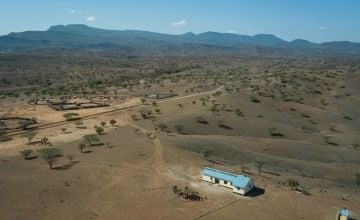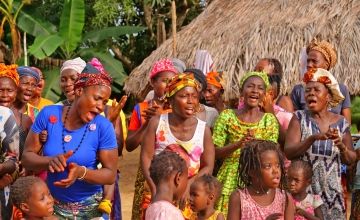
Read our 2023 annual report

Knowledge Hub
On World Malaria Day 2023, we examine how malaria continues to affect the world's poorest communities and our efforts to combat a preventable, curable but life threatening disease.
Concern is currently working in 25 countries, and malaria is currently a high health risk in 20 of these.
Malaria is the leading cause of illness and death in children under five years in South Sudan, and is also a major cause of death in children under five years of age in Chad, Democratic Republic of Congo (DRC) and in Liberia.
The latest report from the World Health Organisation states that, in 2021:
- There were 619,000 death from malaria worldwide
- There were 247 million new cases of malaria worldwide
- 95% of all cases were in Africa
The 2023 Theme for World Malaria Day is: “Time to deliver zero malaria: invest, innovate, implement."
Within this theme, WHO will focus on implementation, and notably the critical importance of reaching marginalised populations with the tools and strategies that are available today.
Malaria prevention
Malaria is a life-threatening disease spread to humans by some types of mosquitoes. It is mostly found in tropical countries. It is preventable and curable.
Prevention is the best and most cost effective strategy. Malaria can be prevented by avoiding mosquito bites or by taking medicines.
There are a number of steps that can be followed in order to reduce the risk of malaria
- Use mosquito nets when sleeping in places where malaria is present
- Use mosquito repellents (containing DEET, IR3535 or Icaridin) after dusk
- Use coils and vaporisers
- Wear protective clothing
- Use window screens
When malaria is contracted, early diagnosis and treatment is essential to save lives.
Since 2021, WHO has recommended broad use of the RTS,S/AS01 malaria vaccine among children living in regions with moderate to high P. falciparum malaria transmission. The vaccine has been shown to significantly reduce malaria among young children.
The link between malaria and malnutrition

In many countries where Concern is working, malaria can be a contributory factor to malnutrition in children especially, and conversely malnutrition can increase the risk of malaria infection.
Concern teams, along with partner Ministries of Health staff, are seeing and responding to these joint threats to children’s lives in countries including Burundi, Chad, DRC, Ethiopia, Kenya, Niger, Somalia, Sudan and South Sudan.
Malaria also increases the risk of poor maternal and newborn outcomes including maternal anaemia, maternal death, spontaneous abortion, stillbirth, prematurity, low birth weight, and newborn and infant death.
'Any death from malaria is unacceptable'
Education for the prevention of malaria transmission is essential. This is, after all, a disease that is 100% preventable.
"Any death from malaria - a preventable and treatable disease - is simply unacceptable," said Dr. Pedro Alonso, the former Director of WHO’s Global Malaria Programme in 2017.
In Central African Republic and in DRC, Concern is working with health facilities to ensure that timely treatment is in place for under 5s who are presenting with fever and possible symptoms of malaria.
In Niger, joint education and treatment of malnutrition and malaria is also supported.

The TAP/Treat and Prevent Malaria project in Sierra Leone, funded by Comic Relief, aimed to increase uptake of preventive measures and appropriate health care seeking by pregnant women and mothers of children under five in Tonkolili District.
The project focused on working with Traditional Healers and Influential Women to decrease inappropriate testing and treatment, by increasing access to and uptake of formal Ministry of Health services during the 3.5 years of implementation.
A final external evaluation report in 2021 stated that the contribution of TAP malaria to reduction in mortality over the lifetime of the project was, “very significant as was the increase in better health seeking rate behaviour at primary level in the beneficiary communities. Sustainability remains a major issue but significant behaviour changes at community level means increasing attendance at health facilities will continue and fewer people will revert to traditional healers."
In South Sudan, health messaging on malaria prevention measures were delivered both at community and health facility levels last year. A survey in September 2022 reported a 67% improvement in knowledge on health-seeking behaviours, and progress towards better protecting child health.
Finally, the Bangladesh Rohingya refugee response team is urging mothers and babies to sleep under an insecticide-treated bed net every night as an important measure in the prevention of malaria. Their pivotal message? Mosquito nets save lives.

Our impact in 2023
people reached through our emergency response
people reached through our health interventions
people reached through our livelihoods programmes

